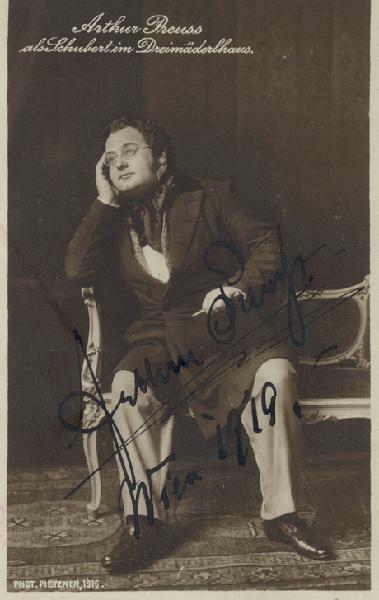Arthur Preuss
Arthur Preuss, born February 2nd, 1878 in Königsberg/Kaliningrad, studied voice in Berlin and got his first engagement in
1899 at no less a theater than the Vienna Hofoper (the later Staatsoper), and from Gustav Mahler, who was then the
Hofoper's manager. Preuss was to sing primarily comprimario parts, occasionally substituting a
colleague in a leading role such as Alfredo or Almaviva. Despite fierce competition (Vienna's
beloved comprimario tenor was Fritz Schrödter), Preuss gained great
popularity; his most famous achievements were David in Meistersinger, Léopold in La Juive, and Pedrillo
in Entführung aus dem Serail. He retired from the Hofoper as early as February 1915,
after a dispute with the notoriously impolite new manager, Hans Gregor.
He didn't accept a permanent engagement anymore, but sang as a guest only, mostly at the
Vienna Volksoper, until 1930. He was one of the first opera singers to appear on air,
and sang also in several films.
In those later years, his voice had become darker, enabling him to sing Fra Diavolo or
Max. He was also a composer (of film music, among others), and ran a successful singing school in Vienna.
He died a tragic death. His son was in former Czechoslovakia as a member of the underground
resistance against the Nazis; since the Gestapo could not get hold of him, they tried to winkle some information out of the
father. During a long Gestapo interrogation on August 20th, 1944, in Vienna, Arthur Preuss "dropped dead"; obviously, the
interrogators stressed him so much that he suffered a heart attack.
That a tenor as fine as Preuss would sing primarily comprimario parts is incredible nowadays;
his voice may have had less power and range than Gustav Mahler expected from a leading singer,
but had he lived today, his would have been a world career. Maybe that even then, his career
would have been more brillant had he just sounded "more German" – his style was very Italianate
for a German speaker of 1910 (note the striking similarity of his Dei miei
bollenti spiriti with De Lucia's). It's worth documenting his entire recorded Pedrillo output, which is a terrific and
unsurmounted achievement.
Reference 1: Preiser LP liner notes, reference 2: Kutsch & Riemens
In RA format
In RA format
| Arthur Preuss sings | Die Entführung aus dem Serail: Vivat Bacchus, with Wilhelm Hesch |
In RA format
In RA format
In RA format
In RA format
This is from a lesser-known 1933 Joseph Schmidt film, Wenn du jung bist,
gehört dir die Welt, and Preuss' role is that of the comic
tenor. He's playing an elderly Kammersänger performing at an elegant private party, and ironically, what he's singing is
one of Schmidt's greatest hits, from an earlier film, Ein Lied geht um die Welt (My song goes round the world). Preuss'
task in the role of the Kammersänger is to produce a complete failure, musically and vocally. Schmidt is playing the usual
son-of-the-housekeeper-gifted-with-a-great-voice-but-no-money, and takes over from the quickly exhausted Kammersänger,
making this sort of a Preuss-Schmidt duet (of sorts!).
|
